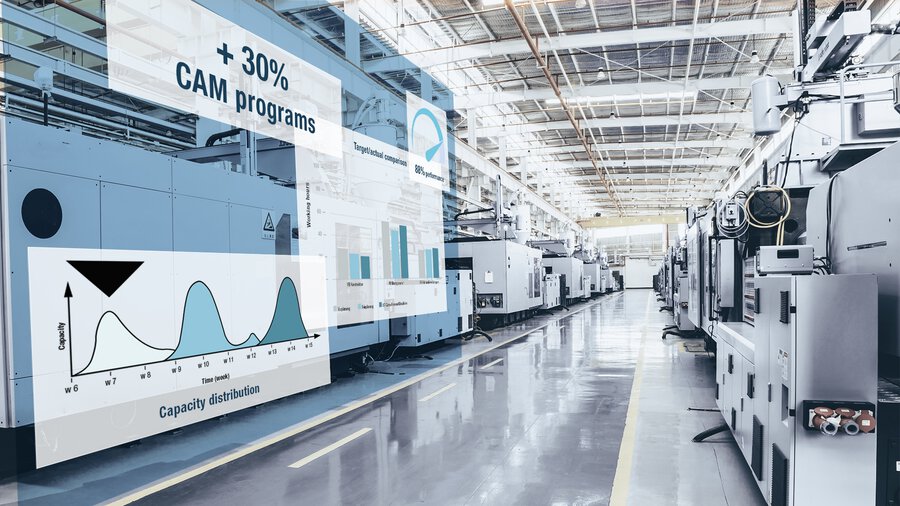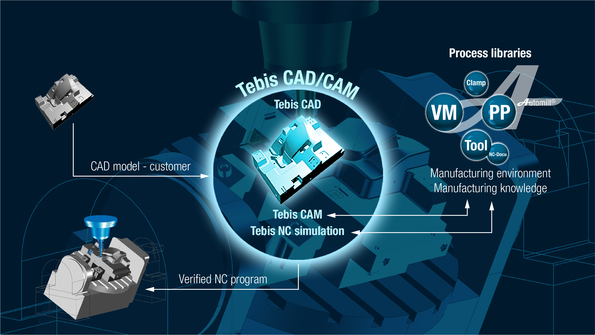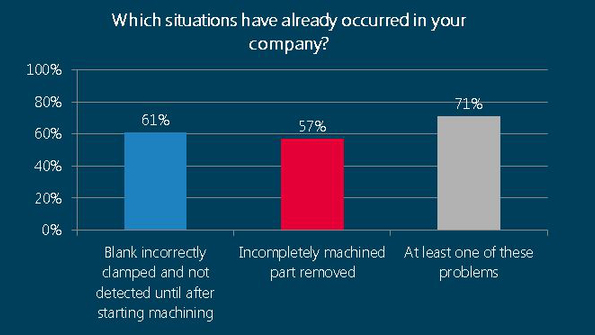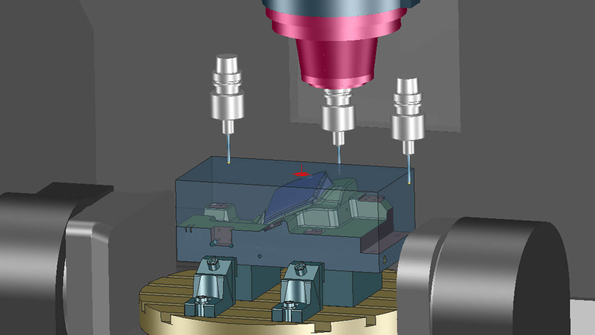What determines the efficiency of a CAD/CAM system?
→ Networked manufacturing boosts productivity with automation
→ Virtual setup increases productivity
→ End-to-end setup parameters from CAD to CAM
→ The CAM program controls calibration in the manufacturing process
→ More efficient CAM programs with digital twins
→ Establish a feedback process and optimize the knowledge base
→ Take the test: CAD/CAM automation and productivity
Networked manufacturing boosts productivity with automation
Efficient manufacturing today means networked manufacturing. In other words: The greatest effects of efficiency improvements are manifested in the process, and this is precisely where the CAD/CAM system comes into its own through automation. A modern manufacturing company should therefore focus on process optimization and the factors affecting it. Optimization at the beginning of the process chain is especially promising. Any increase in efficiency there transfers to subsequent steps with little additional intervention.
This is the advantage of a CAD/CAM system: Your manufacturing process is already represented in the digital world. The easiest way to improve productivity is simply to automate the CAD/CAM process. Even slight adjustments will have a positive effect, and you can then continue organizing and automating other CAD/CAM processes from design to production.
Explore your potential for manufacturing automation now!
Find out more
Automate your CAD/CAM process for greater efficiency
→ Virtual setup for automated CAM programming
Virtual setup brings far more advantages than may appear at first glance. Some process overview is needed at first, but you’ll benefit from significantly more productive time in the long run. You can reduce costs by defining the setup virtually during manufacturing preparation. This is usually automated with templates, so this task can even be entrusted to beginners. This relieves CAM programmers of tasks that don’t necessarily need to be performed in the programming office. There's more: Virtual setup lays the foundation for extensive automation of the CAM programming. Because useful machining can’t be defined until the setup is clear. This means that templates and machining templates optimally build on each other, and verified toolpaths can be generated at the touch of a button.
→ End-to-end setup parameters from CAD to CAM
CAM programming is therefore more efficient with virtual machine setup. Tebis combines the CAD and CAM worlds in an integrated CAD/CAM system. In other words: The CAM programmer can use all parameters 1:1 from CAD data preparation, including the clamping configuration, with zero loss. The converse is also true. If there are any changes in the programming office, the CAD is automatically updated and modified for the new configuration. Your NC programs are generated right from the start and tailored to the right components, saving time and worry – with no iterative corrections between the programming office and production.
→ The CAM program controls calibration
All the necessary information is already incorporated from design and NC programming via the virtual setup and manufacturing preparation. An NC program for measuring is stored in the Job Manager by default and automatically handles positioning. The CAD and CAM parameters are always linked to the component.
There’s no need for the machine operator to program the control or to stand at the machine to measure the part. This automatic step saves a tremendous amount of employee time in setup. Thanks to pre-tested safety with Tebis simulation technology, even quality control can be integrated into the machine process through the CAM program.
→ Maximum safety with simulation and collision checking
In this process, programmers and machine operators need to rely completely on the setup definition and the CAM programs. Tebis 4.1 CAD/CAM software therefore uses only true-to-life parameters from the digital twins in your specific manufacturing environment to simulate setups – fully automatically and in the background. Limit switch problems are quickly a thing of the past. Maximum safety is ensured by virtual machine technology with fully detailed geometry and kinematics and accessed by the postprocessors programmed for your controls.
In calculating the toolpaths, the CAM system also checks the machining operations for collisions with the digital twins for the blank, part, clamping devices and machine. In the event of a warning, the CAM programmer only has to make necessary changes. Checking can then be easily restarted. Only the fully tested NC program with verified toolpaths is sent to the machine.
→ More efficient CAM programs with digital twins
Safe manufacturing means collision-free manufacturing. And fast manufacturing means making optimal use of the machining area while accounting for all components with ideal travel and retract movements. Digital twins are well-known these days. But it's the quality of the digital twin that’s crucial for the best results. Why? Fully detailed digital twins from your production environment let you work more precisely and efficiently in manufacturing. Tebis service engineers scan and measure your machines on-site and model them one-to-one in the Tebis programming environment. Take a look at the video.
→ Establish a feedback process and optimize the knowledge base
You can only achieve efficient, reliable and high-quality results that meet your expectations over the long term by optimally coordinating the machine, tools, clamping devices and CAD/CAM system in your production environment. We recommend that you store frequently used data preparation and proven machining operations as templates in your CAD/CAM software. Every user in the company can then access these in libraries stored in a knowledge base.
Automation in the CAD/CAM system simplifies work and saves time. The knowledge base also incorporates feedback and ideas from the production environment. You can now specify each of your approaches and continually improve your manufacturing results. Valuable production knowledge can be used virtually in the CAD/CAM system, which will keep you productive regardless of employee absence or turnover.
→ Take the test: CAD/CAM automation & productivity
Identify weaknesses and find the greatest potential for your manufacturing automation – free of charge and with no obligation.
| Test the benefits of CAD/CAM automation on your own part! |






